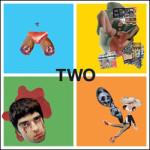
Owls Two
(Polyvinyl)
When I interviewed Owls frontman (also Cap’n Jazz, Make Believe, and Joan of Arc frontman) Tim Kinsella in 2011, I asked him if his lack of critical recognition irked him, and I could tell he was a little fed up of being asked: “We make music to make music; we don’t make music to make money. If we could operate in the same way and make more money that would be good”. It’s funny, really – Kinsella has never taken the path of least resistance, because he modestly treasures his own artistic integrity. He refuses to sing anything pentatonic or strum anything his fans will be able to play on guitar – the sole exception is Two’s anomalously unsyncopated closer A Drop of Blood… For the most part though, Owls’ music forces its listeners to readjust to all these abstruse melodies and lyrics, never succumbing to commercial appeal, and it’s all the more rewarding for it.
Two is very much a sequel to Owls’ 2001 self-titled album, despite the long list of creative endeavours each of the four members can list since its release. Initially the band was formed as an almost-Cap’n Jazz-reunion, missing only Davey van Bohlen (who had moved on to pop-punk semi-fame with The Promise Ring), and it sounded like Cap’n Jazz’s emotional releases deconstructed, then reassembled into abstract psychological puzzles. My entry point into understanding Two was as a further deconstruction of Owls’ debut (but since the material demands so much interpretive effort, I'm really only taking one possible path).
One of my observations is that Kinsella’s work has gotten increasingly metatextual over the years, in stark contrast with his often inscrutably obscure, cathartic style embodied by that first Cap'n Jazz record. Four Works of Art…, the album’s tone-setting opener, gathers four observations with idiosyncratic opacity – a messy car, two separate news stories about David Petraeus and Christopher Kubasik’s affairs, Creedence Clearwater Revival tapes: “And these four works / Are all about / The same one thing / Seen from slightly different perspectives”. It’s not just that he’s getting more reference-heavy; he’s questioning the idea of “works of art” in a way that sets you up for the record’s self-examination of its use-value as an artwork.
This tendency reflects his music’s gravitation away from the frustrated solipsism which characterised Owls’ debut. Back then, he was singing lines like “I’ve been inventing you / and I continue inventing you” (Everyone Is My Friend). It was a record that explored the strangest aspects of social interaction, questioning intersubjectively, slowly taking social relationships apart. But Two’s narrator is a foil to the poet of Owls One, and I feel like he’s chastising that inward-searching character this time round: “It’s cute that you assume / your experience of the world is the world” he yelps on Why Oh Why… That the perspective has changed from inside to outside reflected in one of the record’s key stylistic shifts – rather than Victor Villareal’s frenetic, flittering guitar parts, Two’s most erratic melodies are Sam Zurick’s basslines, which give the songs a structural instability on the opposite end of the spectrum.
Kinsella retracts a little on the next song This Must Be How...: “This must be at least / kind of like / how everyone / kind of feels” – before throwing in a Kinsellian nonsequitir: “Like photosynthesis!” There’s a freaky undercurrent to this record, getting a little darker and more grotesque than usual: “I need to eat your goo”, he leers on Why Oh Why…, relishing its ambiguous vulgarity. Sometimes it’s awkward to the point it’s unbearable – Oh No, Don’t… is deliberately irritating until it jerks into another off-centre faux-funk groove – one of their cohesive moments which shouldn’t work, but totally does. Whatever the outcome, Owls barely go two lines without making moves very few other songwriters or musicians would make.
Kinsella’s aforementioned frustration with his lack of commercial appeal is in an ironic tension with his music’s dizzying unconventionality, and the paradox constellates during Ancient Stars Seed…, with one of Owls’ trademark songwriting tricks: Kinsella has a habit of highlighting his climactic lyrics by setting them to his most orthodox melodies. “We’ve never had nice stuff, we’ve never owned a nice thing / And we’ve never really even been friends with anyone with nice stuff”, he yells, and while these guys clearly aren’t seriously struggling, it’s fun to hear them let go about this. Kinsella has said that this line is his perplexed reaction to other bands’ arrays of pedals and kit, thinking “where do you possibly get the money for that equipment?” It’s belted out with a kind of pride. Owls and their plethora of side-projects have the stability of a devoted cult following and it’s all Kinsella can do to maintain a steady career, releasing at least a record a year under various guises, sometimes hitting on something that really resonates. His artistic successes fluctuate by anyone’s standards, but Two is a gem amongst the labyrinthine post-Cap’n Jazz projects. It keeps rewarding on heavy rotation, and its awkwardness as an art-object only emphasises its most intriguing statements.
15 April, 2014 - 04:13 — Stephen Wragg